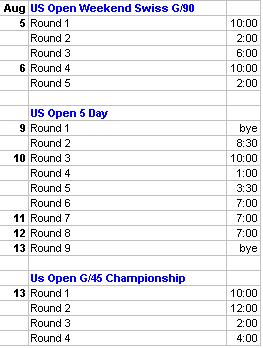Be up front with yourself about your real goal. Is it really/only to reach 2000? Then why play 21 games at the US Open? Wouldn't you learn and improve more by playing just a few focused games, and spending the saved time and energy in analysis and study? (Your own analysis, NOT Fritz.)
Yes I agree. So my new US Open schedule looks like:

I am only playing 4 extra games on the 13th, since the tournament on July 5-6 is a separate event. This way I should be able to watch the end of the main event since the G/45 event should end by 5:30
Do you have a teacher - a master or better?
I am working on getting one.
Are you studying endings? Do you know by heart ALL the basic positions in Dvoretsky's Endgame Manual? Now there's a good way to get to 2000.
Yes I am, I started with Rook and pawn endings, I am also working on the Dvoretsky's Endgame Manual.
Last but not least - why time trouble so often? How are you addressing that?
Two out of the first three events on my shedule were G/30. I don't have any more fast time control events scheduled except for the G/45 US Championship event, so I should not get into time trouble that often.
That still looks like a lot of games, but congratulations on cutting it down! Something to consider: I think you learn more from one slow game than half a dozen G/30 or G/45.
ReplyDeleteKnowing those two hundred (?) basic endings *by heart* is key - that's the work that I myself don't want to do. (Guitar.) But if you take the plunge ... I recommend flashcards.
In your earlier post, I noticed many references to what "Fritz thinks." Here's my suggestion: put away Fritz for six months. Think for yourself. I'd love to see your analysis of one of your games, from start to finish, with your explanation of *each move* that you made, and your positional assessments along the way. (This, btw, is the method recommended by Bronstein, and Botvinnik - not my brilliant idea. Learning comes from quality time spent on positions. You gotta learn from your mistakes.)
-ashish